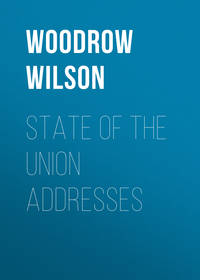 полная версия
полная версияThe New Freedom
It has surprised the people of the United States to find New Jersey at the front in enterprises of reform. I, who have lived in New Jersey the greater part of my mature life, know that there is no state in the Union which, so far as the hearts and intelligence of its people are concerned, has more earnestly desired reform than has New Jersey. There are men who have been prominent in the affairs of the State who again and again advocated with all the earnestness that was in them the things that we have at last been able to do. There are men in New Jersey who have spent some of the best energies of their lives in trying to win elections in order to get the support of the citizens of New Jersey for programs of reform.
The people had voted for such things very often before the autumn of 1910, but the interesting thing is that nothing had happened. They were demanding the benefit of remedial measures such as had been passed in every progressive state of the Union, measures which had proved not only that they did not upset the life of the communities to which they were applied but that they quickened every force and bettered every condition in those communities. But the people of New Jersey could not get them, and there had come upon them a certain pessimistic despair. I used to meet men who shrugged their shoulders and said: "What difference does it make how we vote? Nothing ever results from our votes." The force that is behind the new party that has recently been formed, the so-called "Progressive Party," is a force of discontent with the old parties of the United States. It is the feeling that men have gone into blind alleys often enough, and that somehow there must be found an open road through which men may pass to some purpose.
In the year 1910 there came a day when the people of New Jersey took heart to believe that something could be accomplished. I had no merit as a candidate for Governor, except that I said what I really thought, and the compliment that the people paid me was in believing that I meant what I said. Unless they had believed in the Governor whom they then elected, unless they had trusted him deeply and altogether, he could have done absolutely nothing. The force of the public men of a nation lies in the faith and the backing of the people of the country, rather than in any gifts of their own. In proportion as you trust them, in proportion as you back them up, in proportion as you lend them your strength, are they strong. The things that have happened in New Jersey since 1910 have happened because the seed was planted in this fine fertile soil of confidence, of trust, of renewed hope.
The moment the forces in New Jersey that had resisted reform realized that the people were backing new men who meant what they had said, they realized that they dare not resist them. It was not the personal force of the new officials; it was the moral strength of their backing that accomplished the extraordinary result.
And what was accomplished? Mere justice to classes that had not been treated justly before.
Every schoolboy in the State of New Jersey, if he cared to look into the matter, could comprehend the fact that the laws applying to laboring-men with respect of compensation when they were hurt in their various employments had originated at a time when society was organized very differently from the way in which it is organized now, and that because the law had not been changed, the courts were obliged to go blindly on administering laws which were cruelly unsuitable to existing conditions, so that it was practically impossible for the workingmen of New Jersey to get justice from the courts; the legislature of the commonwealth had not come to their assistance with the necessary legislation. Nobody seriously debated the circumstances; everybody knew that the law was antiquated and impossible; everybody knew that justice waited to be done. Very well, then, why wasn't it done?
There was another thing that we wanted to do: We wanted to regulate our public service corporations so that we could get the proper service from them, and on reasonable terms. That had been done elsewhere, and where it had been done it had proved just as much for the benefit of the corporations themselves as for the benefit of the people. Of course it was somewhat difficult to convince the corporations. It happened that one of the men who knew the least about the subject was the president of the Public Service Corporation of New Jersey. I have heard speeches from that gentleman that exhibited a total lack of acquaintance with the circumstances of our times. I have never known ignorance so complete in its detail; and, being a man of force and ignorance, he naturally set all his energy to resist the things that he did not comprehend.
I am not interested in questioning the motives of men in such positions. I am only sorry that they don't know more. If they would only join the procession they would find themselves benefited by the healthful exercise, which, for one thing, would renew within them the capacity to learn which I hope they possessed when they were younger. We were not trying to do anything novel in New Jersey in regulating the Public Service Corporation; we were simply trying to adopt there a tested measure of public justice. We adopted it. Has anybody gone bankrupt since? Does anybody now doubt that it was just as much for the benefit of the Public Service Corporation as for the people of the State?
Then there was another thing that we modestly desired: We wanted fair elections; we did not want candidates to buy themselves into office. That seemed reasonable. So we adopted a law, unique in one particular, namely: that if you bought an office, you didn't get it. I admit that that is contrary to all commercial principles, but I think it is pretty good political doctrine. It is all very well to put a man in jail for buying an office, but it is very much better, besides putting him in jail, to show him that if he has paid out a single dollar for that office, he does not get it, though a huge majority voted for him. We reversed the laws of trade; when you buy something in politics in New Jersey, you do not get it. It seemed to us that that was the best way to discourage improper political argument. If your money does not produce the goods, then you are not tempted to spend your money.
We adopted a Corrupt Practices Act, the reasonable foundation of which no man could question, and an Election Act, which every man predicted was not going to work, but which did work,—to the emancipation of the voters of New Jersey.
All these things are now commonplaces with us. We like the laws that we have passed, and no man ventures to suggest any material change in them. Why didn't we get them long ago? What hindered us? Why, because we had a closed government; not an open government. It did not belong to us. It was managed by little groups of men whose names we knew, but whom somehow we didn't seem able to dislodge. When we elected men pledged to dislodge them, they only went into partnership with them. Apparently what was necessary was to call in an amateur who knew so little about the game that he supposed that he was expected to do what he had promised to do.
There are gentlemen who have criticised the Governor of New Jersey because he did not do certain things,—for instance, bring a lot of indictments. The Governor of New Jersey does not think it necessary to defend himself; but he would like to call attention to a very interesting thing that happened in his State: When the people had taken over control of the government, a curious change was wrought in the souls of a great many men; a sudden moral awakening took place, and we simply could not find culprits against whom to bring indictments; it was like a Sunday school, the way they obeyed the laws.
So I say, there is nothing very difficult about resuming our own government. There is nothing to appall us when we make up our minds to set about the task. "The way to resume is to resume," said Horace Greeley, once, when the country was frightened at a prospect which turned out to be not in the least frightful; it was at the moment of the resumption of specie payments for Treasury notes. The Treasury simply resumed,—there was not a ripple of danger or excitement when the day of resumption came around.
It will be precisely so when the people resume control of their own government. The men who conduct the political machines are a small fraction of the party they pretend to represent, and the men who exercise corrupt influences upon them are only a small fraction of the business men of the country. What we are banded together to fight is not a party, is not a great body of citizens; we have to fight only little coteries, groups of men here and there, a few men, who subsist by deceiving us and cannot subsist a moment after they cease to deceive us.
I had occasion to test the power of such a group in the State of New Jersey, and I had the satisfaction of discovering that I had been right in supposing that they did not possess any power at all. It looked as if they were entrenched in a fortress; it looked as if the embrasures of the fortress showed the muzzles of guns; but, as I told my good fellow-citizens, all they had to do was to press a little upon it and they would find that the fortress was a mere cardboard fabric; that it was a piece of stage property; that just so soon as the audience got ready to look behind the scenes they would learn that the army which had been marching and counter-marching in such terrifying array consisted of a single company that had gone in one wing and around and out at the other wing, and could have thus marched in procession for twenty-four hours. You only need about twenty-four men to do the trick. These men are impostors. They are powerful only in proportion as we are susceptible to absurd fear of them. Their capital is our ignorance and our credulity.
To-day we are seeing something that some of us have waited all of our lives to see. We are witnessing a rising of the country. We are seeing a whole people stand up and decline any longer to be imposed upon. The day has come when men are saying to each other: "It doesn't make a peppercorn's difference to me what party I have voted with. I am going to pick out the men I want and the policies I want, and let the label take care of itself. I do not find any great difference between my table of contents and the table of contents of those who have voted with the other party, and who, like me, are very much dissatisfied with the way in which their party has rewarded their faithfulness. They want the same things that I want, and I don't know of anything under God's heaven to prevent our getting together. We want the same things, we have the same faith in the old traditions of the American people, and we have made up our minds that we are going to have now at last the reality instead of the shadow."
We Americans have been too long satisfied with merely going through the motions of government. We have been having a mock game. We have been going to the polls and saying: "This is the act of a sovereign people, but we won't be the sovereign yet; we will postpone that; we will wait until another time. The managers are still shifting the scenes; we are not ready for the real thing yet."
My proposal is that we stop going through the mimic play; that we get out and translate the ideals of American politics into action; so that every man, when he goes to the polls on election day, will feel the thrill of executing an actual judgment, as he takes again into his own hands the great matters which have been too long left to men deputized by their own choice, and seriously sets about carrying into accomplishment his own purposes.
XI
THE EMANCIPATION OF BUSINESS
In the readjustments that are about to be undertaken in this country not one single legitimate or honest arrangement is going to be disturbed; but every impediment to business is going to be removed, every illegitimate kind of control is going to be destroyed. Every man who wants an opportunity and has the energy to seize it, is going to be given a chance. All that we are going to ask the gentlemen who now enjoy monopolistic advantages to do is to match their brains against the brains of those who will then compete with them. The brains, the energy, of the rest of us are to be set free to go into the game,—that is all. There is to be a general release of the capital, the enterprise, of millions of people, a general opening of the doors of opportunity. With what a spring of determination, with what a shout of jubilance, will the people rise to their emancipation!
I am one of those who believe that we have had such restrictions upon the prosperity of this country that we have not yet come into our own, and that by removing those restrictions we shall set free an energy which in our generation has not been known. It is for that reason that I feel free to criticise with the utmost frankness these restrictions, and the means by which they have been brought about. I do not criticise as one without hope; in describing conditions which so hamper, impede, and imprison, I am only describing conditions from which we are going to escape into a contrasting age. I believe that this is a time when there should be unqualified frankness. One of the distressing circumstances of our day is this: I cannot tell you how many men of business, how many important men of business, have communicated their real opinions about the situation in the United States to me privately and confidentially. They are afraid of somebody. They are afraid to make their real opinions known publicly; they tell them to me behind their hand. That is very distressing. That means that we are not masters of our own opinions, except when we vote, and even then we are careful to vote very privately indeed.
It is alarming that this should be the case. Why should any man in free America be afraid of any other man? Or why should any man fear competition,—competition either with his fellow-countrymen or with anybody else on earth?
It is part of the indictment against the protective policy of the United States that it has weakened and not enhanced the vigor of our people. American manufacturers who know that they can make better things than are made elsewhere in the world, that they can sell them cheaper in foreign markets than they are sold in these very markets of domestic manufacture, are afraid,—afraid to venture out into the great world on their own merits and their own skill. Think of it, a nation full of genius and yet paralyzed by timidity! The timidity of the business men of America is to me nothing less than amazing. They are tied to the apron strings of the government at Washington. They go about to seek favors. They say: "For pity's sake, don't expose us to the weather of the world; put some homelike cover over us. Protect us. See to it that foreign men don't come in and match their brains with ours." And, as if to enhance this peculiarity of ours, the strongest men amongst us get the biggest favors; the men of peculiar genius for organizing industries, the men who could run the industries of any country, are the men who are most strongly intrenched behind the highest rates in the schedules of the tariff. They are so timid morally, furthermore, that they dare not stand up before the American people, but conceal these favors in the verbiage of the tariff schedule itself,—in "jokers." Ah! but it is a bitter joke when men who seek favors are so afraid of the best judgment of their fellow-citizens that they dare not avow what they take.
Happily, the general revival of conscience in this country has not been confined to those who were consciously fighting special privilege. The awakening of conscience has extended to those who were enjoying special privileges, and I thank God that the business men of this country are beginning to see our economic organization in its true light, as a deadening aristocracy of privilege from which they themselves must escape. The small men of this country are not deluded, and not all of the big business men of this country are deluded. Some men who have been led into wrong practices, who have been led into the practices of monopoly, because that seemed to be the drift and inevitable method of supremacy, are just as ready as we are to turn about and adopt the process of freedom. For American hearts beat in a lot of these men, just as they beat under our jackets. They will be as glad to be free as we shall be to set them free. And then the splendid force which has lent itself to things that hurt us will lend itself to things that benefit us.
And we,—we who are not great captains of industry or business,—shall do them more good than we do now, even in a material way. If you have to be subservient, you are not even making the rich fellows as rich as they might be, because you are not adding your originative force to the extraordinary production of wealth in America. America is as rich, not as Wall Street, not as the financial centres in Chicago and St. Louis and San Francisco; it is as rich as the people that make those centres rich. And if those people hesitate in their enterprise, cower in the face of power, hesitate to originate designs of their own, then the very fountains which make these places abound in wealth are dried up at the source. By setting the little men of America free, you are not damaging the giants.
It may be that certain things will happen, for monopoly in this country is carrying a body of water such as men ought not to be asked to carry. When by regulated competition,—that is to say, fair competition, competition that fights fair,—they are put upon their mettle, they will have to economize, and they cannot economize unless they get rid of that water. I do not know how to squeeze the water out, but they will get rid of it, if you will put them to the necessity. They will have to get rid of it, or those of us who don't carry tanks will outrun them in the race. Put all the business of America upon the footing of economy and efficiency, and then let the race be to the strongest and the swiftest.
Our program is a program of prosperity; a program of prosperity that is to be a little more pervasive than the present prosperity,—and pervasive prosperity is more fruitful than that which is narrow and restrictive. I congratulate the monopolies of the United States that they are not going to have their way, because, quite contrary to their own theory, the fact is that the people are wiser than they are. The people of the United States understand the United States as these gentlemen do not, and if they will only give us leave, we will not only make them rich, but we will make them happy. Because, then, their conscience will have less to carry. I have lived in a state that was owned by a series of corporations. They handed it about. It was at one time owned by the Pennsylvania Railroad; then it was owned by the Public Service Corporation. It was owned by the Public Service Corporation when I was admitted, and that corporation has been resentful ever since that I interfered with its tenancy. But I really did not see any reason why the people should give up their own residence to so small a body of men to monopolize; and, therefore, when I asked them for their title deeds and they couldn't produce them, and there was no court except the court of public opinion to resort to, they moved out. Now they eat out of our hands; and they are not losing flesh either. They are making just as much money as they made before, only they are making it in a more respectable way. They are making it without the constant assistance of the legislature of the State of New Jersey. They are making it in the normal way, by supplying the people of New Jersey with the service in the way of transportation and gas and water that they really need. I do not believe that there are any thoughtful officials of the Public Service Corporation of New Jersey that now seriously regret the change that has come about. We liberated government in my state, and it is an interesting fact that we have not suffered one moment in prosperity.
What we propose, therefore, in this program of freedom, is a program of general advantage. Almost every monopoly that has resisted dissolution has resisted the real interests of its own stockholders. Monopoly always checks development, weighs down natural prosperity, pulls against natural advance.
Take but such an everyday thing as a useful invention and the putting of it at the service of men. You know how prolific the American mind has been in invention; how much civilization has been advanced by the steamboat, the cotton-gin, the sewing-machine, the reaping-machine, the typewriter, the electric light, the telephone, the phonograph. Do you know, have you had occasion to learn, that there is no hospitality for invention nowadays? There is no encouragement for you to set your wits at work to improve the telephone, or the camera, or some piece of machinery, or some mechanical process; you are not invited to find a shorter and cheaper way to make things or to perfect them, or to invent better things to take their place. There is too much money invested in old machinery; too much money has been spent advertising the old camera; the telephone plants, as they are, cost too much to permit their being superseded by something better. Wherever there is monopoly, not only is there no incentive to improve, but, improvement being costly in that it "scraps" old machinery and destroys the value of old products, there is a positive motive against improvement. The instinct of monopoly is against novelty, the tendency of monopoly is to keep in use the old thing, made in the old way; its disposition is to "standardize" everything. Standardization may be all very well,—but suppose everything had been standardized thirty years ago,—we should still be writing by hand, by gas-light, we should be without the inestimable aid of the telephone (sometimes, I admit, it is a nuisance), without the automobile, without wireless telegraphy. Personally, I could have managed to plod along without the aeroplane, and I could have been happy even without moving-pictures.
Of course, I am not saying that all invention has been stopped by the growth of trusts, but I think it is perfectly clear that invention in many fields has been discouraged, that inventors have been prevented from reaping the full fruits of their ingenuity and industry, and that mankind has been deprived of many comforts and conveniences, as well as of the opportunity of buying at lower prices.
The damper put on the inventive genius of America by the trusts operates in half a dozen ways: The first thing discovered by the genius whose device extends into a field controlled by a trust is that he can't get capital to make and market his invention. If you want money to build your plant and advertise your product and employ your agents and make a market for it, where are you going to get it? The minute you apply for money or credit, this proposition is put to you by the banks: "This invention will interfere with the established processes and the market control of certain great industries. We are already financing those industries, their securities are in our hands; we will consult them."
It may be, as a result of that consultation, you will be informed that it is too bad, but it will be impossible to "accommodate" you. It may be you will receive a suggestion that if you care to make certain arrangements with the trust, you will be permitted to manufacture. It may be you will receive an offer to buy your patent, the offer being a poor consolation dole. It may be that your invention, even if purchased, will never be heard of again.
That last method of dealing with an invention, by the way, is a particularly vicious misuse of the patent laws, which ought not to allow property in an idea which is never intended to be realized. One of the reforms waiting to be undertaken is a revision of our patent laws.
In any event, if the trust doesn't want you to manufacture your invention, you will not be allowed to, unless you have money of your own and are willing to risk it fighting the monopolistic trust with its vast resources. I am generalizing the statement, but I could particularize it. I could tell you instances where exactly that thing happened. By the combination of great industries, manufactured products are not only being standardized, but they are too often being kept at a single point of development and efficiency. The increase of the power to produce in proportion to the cost of production is not studied in America as it used to be studied, because if you don't have to improve your processes in order to excel a competitor, if you are human you aren't going to improve your processes; and if you can prevent the competitor from coming into the field, then you can sit at your leisure, and, behind this wall of protection which prevents the brains of any foreigner competing with you, you can rest at your ease for a whole generation.







